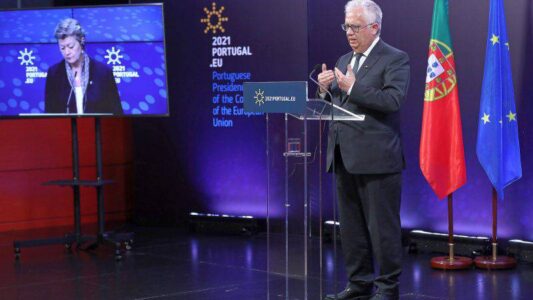
Portugal wants online terrorism content removed within an hour
One priority of the Portuguese presidency of the Council of the EU is to conclude the legislative process that will allow terrorist content placed on the Internet to be eliminated in just one hour, Portugal’s minister of internal affairs, Eduardo Cabrita, said in Madrid on Thursday (11 March).
Speaking on the sidelines of the ceremony to commemorate the European Day for the Victims of Terrorism, Cabrita said that the fight against this scourge is a “common challenge” for all member states and that the Portuguese presidency has “clear priorities” in this area.
Cabrita acknowledged that Portugal had not been a priority target of terrorist attacks but that, within the framework of its European responsibility and as it chairs the presidency of the Council of the EU, he considered it to be a common issue.
He listed three priorities in this area, the first being to work together with the other member-states in the European Strategy of the fight against terrorism.
Secondly, the conclusion of the regulatory process on eradicating and eliminating online terrorist contents so terrorist content can be removed from digital platforms in an hour, he added.
Finally, the Portuguese presidency intends to expand the debate on Europol’s new mandate, to strengthen the coordination of this organisation with national police forces.
Europol is a European police service for processing and exchanging criminal information, contributing to the enforcement of EU laws, mainly in the fight against organised crime.
Terrorism fatalities were remembered today at several ceremonies in Madrid, the city that 17 years ago was the target of one of the largest terrorist attacks in history, with 193 people killed.
“We have to be resilient [in the fight against terrorism] without becoming a fortress of security,” Cabrita said, adding that Europe must ensure that new attacks do not occur.
The European Day for the Victims of Terrorism, commemorated on 11 March each year by the European Parliament days after the jihadist massacre in the Spanish capital in 2004, had a central tribute presided over by the kings of Spain.
The 11 March 2004 attacks in Madrid were coordinated, near-simultaneous terrorist attacks against the Spanish capital’s suburban train system three days before the Spanish general elections.
The explosions killed 193 people and injured 2,050. The official investigation by Spanish justice concluded that a terrorist cell inspired by al-Qaida directed the attacks, although that organisation was not directly involved.
Source: Euractiv





